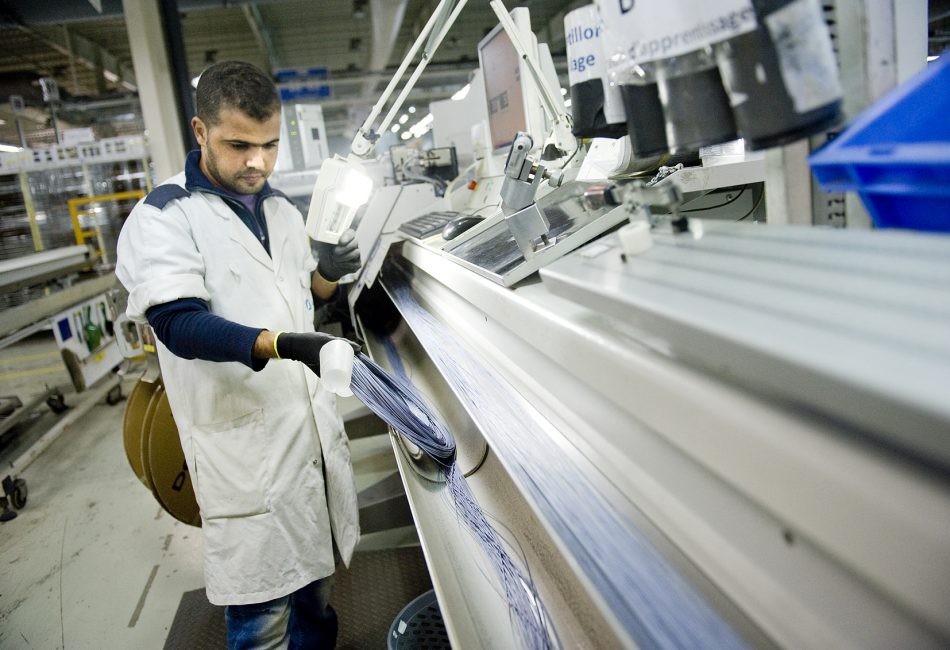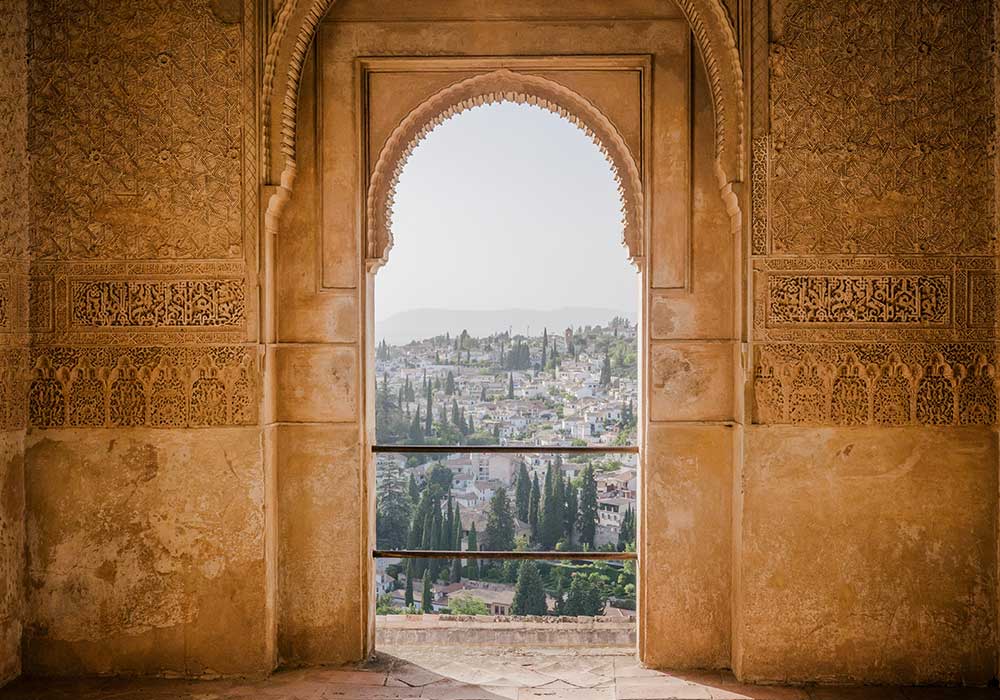
NABC and Morocco
In October 2023, NABC participated, together with 36 Dutch organisations, in the Netherlands Economic Mission to Casablanca, Rabat, and Agadir, representing the African-focused private sector in the Netherlands, at the invitation of the Netherlands Enterprise Agency (RVO). The mission centred on water, agriculture, and horticulture and was led by Dutch Minister Schreinemacher.
The NABC organised a study visit, consisting of senior Moroccan administrators who pursue an MBA at the Hassan II university in Rabat or ESCA in Casablanca, in November 2022. You can read more about this study visit at the NABC Track Record page.
Photo: An employee of a factory that manufactures electric wires for cars in Tanger. (C) Rik Goverde
In response to an invitation issued by the office of the Agricultural Counsellor at The Kingdom of the Netherlands Embassy in Rabat, NABC developed an “Opportunity Identification Study on the Poultry Value Chains in Morocco” and subsequently shared the results with the Dutch poultry private sector in a Webinar in April 2022.
In addition, the NABC and the Moroccan Investment and Export Development Agency (AMDIE), that is part of the Moroccan Ministry of Commerce, signed a one-year contract in April 2022, to promote investments and developments in the Moroccan Agri-Food processing sector.
In April 2019, the fourth edition of Africa Works! was themed ‘Future African Cities.’ It was opened by Ahmed Aboutaleb, the mayor of Rotterdam. Morocco hosted a country workshop where it highlighted investment opportunities in Morocco’s main cities.
In 2018, the NABC conducted a business opportunity report on Morocco’s Renewable Energy Sector and on the reuse of wastewater in Morocco.
In 2016, NABC received an incoming trade delegation from Morocco including the Agency for Solar Energy, Ministry of Water, Energy & Environment and L’office Chériefien des Phosphates. In preparation of the COP 22 the Moroccan delegation came to the Netherlands to meet Dutch companies for trade, business and investment opportunities.
Investment Climate
Morocco’s investment climate is widely regarded as one of the most favourable in Africa, underpinned by its political stability, strategic location and proactive reform agenda. The country has positioned itself as a gateway between Europe, Africa and the Middle East, benefitting from more than 50 free trade agreements, including accords with the European Union and the United States, which provide privileged access to over one billion consumers. Strong infrastructure further enhances Morocco’s attractiveness, with Tanger-Med ranking among the largest ports in the world and an extensive logistics network that includes industrial free zones and Africa’s first high-speed rail line.
The government has implemented substantial reforms to improve the ease of doing business, notably through the 2022 Investment Charter, which streamlines administrative procedures, strengthens investor protections and provides significant fiscal incentives, including tax exemptions and subsidies covering up to 30 per cent of project costs. Regional investment centres have been established to decentralise decision-making and facilitate investor support at the local level.
Morocco has also become a leader in renewable energy, with a national strategy targeting 52 per cent of installed capacity from renewable sources by 2030. Flagship projects such as the Noor Ouarzazate solar complex, alongside major wind and hydro initiatives, highlight the country’s ambition to be a global clean energy hub. At the same time, Morocco has developed competitive industrial clusters, notably in automotive manufacturing, where it is now Africa’s largest producer, and in aerospace, supported by international investors in dedicated industrial parks.
The financial sector is another pillar of Morocco’s investment climate, with Casablanca Finance City serving as a regional hub for multinational companies expanding into Africa. Combined with steady GDP growth projections (3.8 per cent for 2025–2026 according to the OECD) Morocco offers a dynamic and increasingly diversified environment for investors seeking access to both African and global markets.
Investment Climate Key Indicators & Metrics:
| Measure | Year | Index/Rank |
| Corruption Perceptions Index | 2024 | 99 of 180 |
| Economic Freedom Index | 2025 | 86 of 184 |
| Global Innovation Index | 2025 | 57 of 139 |
| FDI Inflows (% of GDP) | 2024 | 1.1 % |

Opportunities
Morocco presents a wide range of opportunities for investors across both established and emerging sectors. Agriculture remains a priority, with significant potential for modernisation, value-added processing and agri-tech solutions aimed at improving productivity and reducing reliance on imports (World Bank). The country is also a rising hub for renewable energy, with large-scale projects in solar, wind and hydro positioning Morocco as a regional leader in the global energy transition. Ambitious targets to generate more than half of its electricity capacity from renewable sources by 2030 provide long-term opportunities in energy generation, grid infrastructure and green hydrogen development.
Industrial sectors are a particular strength of Morocco’s export economy. The automotive industry has become a flagship sector, making Morocco Africa’s second largest vehicle exporter, with significant investment from the Renault-Nissan alliance and the PSA Group (Stellantis). Similarly, the aerospace sector is thriving, with Morocco manufacturing aircraft components for global leaders such as Bombardier, Delphi, Eaton Corp and Stelia Aerospace. In partnership with Boeing, the country is also working towards establishing a dedicated aerospace suppliers’ ecosystem. These developments highlight Morocco’s success in building competitive industrial value chains that are increasingly integrated into global supply networks.
Mining represents another area of opportunity. Morocco is the world’s largest producer of phosphate, used primarily in agricultural fertilisers, one of the country’s key export products. Fertiliser exports alone account for around USD 1.7 billion annually, and the government is encouraging investment in underdeveloped segments of the wider mining sector to diversify beyond phosphates.
Agriculture and agri-food exports are also central to Morocco’s growth strategy. The horticulture sector is particularly dynamic, with exports of tomatoes, beans, peppers, avocados, pumpkins, olives, onions, cucumbers, potatoes, strawberries, peaches, mandarins, melons, grapes, almonds and dates. Tomatoes stand out as a major export product during the European winter season, particularly from Agadir, Guelmim, Safi and Dakhla. This provides opportunities not only for growers but also for Dutch and European suppliers of greenhouse technologies, seed breeding, irrigation systems, and solar-powered pumps. Morocco also leads in fruit exports, with over 140,000 tonnes of soft fruits exported annually, of which 40 per cent is red fruit. Around 90 per cent of this production is exported to the EU, with Morocco emerging as a market leader in frozen strawberries.
The poultry industry is another expanding market. While the upstream broiler sector is relatively well organised, downstream activities in processing, branding and marketing remain underdeveloped. This creates clear opportunities for suppliers of slaughtering equipment, cold storage facilities, packaging technologies and marketing solutions. Similarly, Morocco is the largest African producer of maritime fisheries, with an emerging aquaculture sector supported by government ambitions to expand freshwater fish farming. These developments offer investment potential across fisheries infrastructure, cold chain logistics and feed technologies.
Textiles and apparel continue to form an important part of Morocco’s export profile, benefitting from rising labour costs in Asia, geographical proximity to Europe and an increasing demand for sustainable production. Morocco’s fashion and textile industry has expanded exports of knitwear and is becoming a more attractive sourcing option for international brands seeking flexibility and speed-to-market.
Morocco also maintains strong import ties with Europe, including the Netherlands. In 2018, Morocco imported approximately €1 billion worth of goods from the Netherlands, including petroleum products, crude oil, fish, shellfish, molluscs and plant-based oils and fats. These flows illustrate the country’s interconnected role in regional and global trade.
With a young, educated and increasingly urbanised population, Morocco offers a dynamic consumer base. Expanding sectors such as healthcare, education, ICT and tourism benefit from rising domestic demand as well as international partnerships. Moreover, Morocco’s participation in the African Continental Free Trade Area (AfCFTA) reinforces its role as a competitive export platform for companies seeking access to wider African markets.
Challenges
Despite Morocco’s strong progress in building an attractive investment climate, several challenges remain that investors should consider. One persistent issue is the uneven regional distribution of investment, with Casablanca, Rabat and Tangier capturing the majority of projects, while inland and rural regions continue to lag behind. This imbalance can create disparities in infrastructure, labour market readiness and ease of access to local services, potentially complicating expansion outside the main economic hubs.
Administrative procedures and bureaucratic hurdles also continue to present difficulties, despite ongoing reforms under the 2022 Investment Charter. Morocco was ranked 99th out of 180 countries in Transparency International’s 2024 Corruption Perceptions Index.
-
The labour market represents another structural challenge. While Morocco has a relatively young and increasingly well-educated workforce, youth unemployment and low female participation rates remain high. Skills mismatches between graduates and the needs of employers are often cited as a constraint, particularly in high-technology industries. Addressing these issues requires deeper reforms in vocational training and closer alignment between education and private sector demands.
Morocco is also vulnerable to climate change and water scarcity, given the weight of agriculture in its economy. Droughts in recent years have reduced agricultural output and pressured rural livelihoods, underlining the urgency of investments in climate adaptation, water efficiency and sustainable resource management. This is a long-term challenge but also an area where international expertise and technology can make a positive impact.
Diplomatic relations
The Netherlands
Embassy
The Netherlands is represented in Morocco via its embassy in the capital Rabat, led by H.E. Amb Dirk Jan Nieuwenhuis, who took office in 2024. The Agricultural Counselor is Mrs. Patricia de Vries, since 2024.
Morocco
Embassy
Morocco is represented in the Netherlands via its embassy in The Hague, led by H.E. Amb Mohamed El Basri, who took office in 2022.
Presence of Dutch companies
There are currently over 70 Dutch companies active in Morocco.
Webinars
14th April, 2022. Business Opportunities in the Moroccan Poultry Sector. The recording is available via our YouTube channel.


